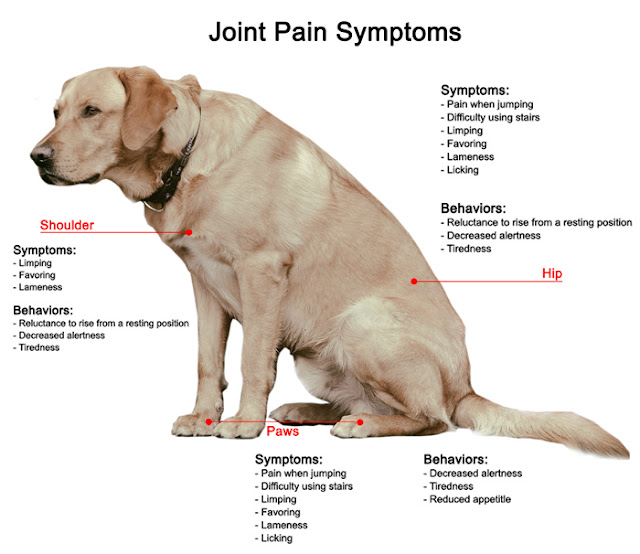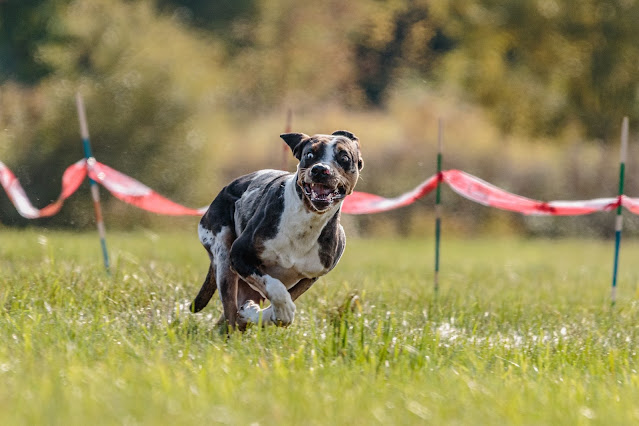Canines' joints take a beating, from pursuing tennis balls to leaping off the back deck. What's more, for certain canines, that is an issue. More use implies more wounds and can prompt joint-related issues like ACL (front cruciate tendon) tears and osteoarthritis. WebMD chatted with James L. "Jimi" Cook, the head of the Comparative Orthopedic Laboratory at the University of Missouri-Columbia, about canine joint issues and what's going on in their treatment.
B: What causes osteoarthritis or joint issues in canines?
A: The two significant classes of joint issues are formative and degenerative issues. With formative issues, you have things like hip or elbow dysplasia, where the joint doesn't foster accurately in that frame of mind in various ways.
Degenerative issues cover various regions. Be that as it may, the most well-known, and the most widely recognized reason for joint pain in canines, is cruciate tendon issues, where the tendon is declining over the long run and causing flimsiness and optional osteoarthritis.
B: What are the indications of joint issues?
A: Most of the time, individuals notice that their canines are doing less or having more trouble with normal exercises. The canine presently has issues getting up on the lounge chair, or going up the steps, or getting toward the rear of the SUV. With additional athletic canines, perhaps they can't run as lengthy with their proprietor, or they would rather not play as lengthy at the canine park.
From that point it advances to unmistakable faltering - - holding the appendage up, or holding the appendage interesting. Those are the most widely recognized things we see. Seldom do we consider plain agony to be the main protest. Generally it's a more slow cycle.
B: Are a few varieties more inclined to joint wounds?
A: by and large, expanded size and weight is consistently a pre dispose of joint issues. So the perfect examples for both formative and degenerative issues will be the greater canines.
Be that as it may, for specific things, there are very breed-explicit issues. Newfoundlands have the most elevated predominance of cruciate tendon infection, everything being equal. Rottweilers have more knee and lower leg issues. Bernese Mountain canines ordinarily get elbow dysplasia.
B: It appears that more canines presently are having medicines for joint issues.
Are there additional issues, or would we say we are just treating them on a more regular basis?
A: We have further developed diagnostics and further developed medical care. Individuals focus closer on their canines and look for care prior and more regularly. Furthermore, a part of it is a reproducing issue. Reproducers are rearing for the characteristics they need. Yet, that can raise in different qualities that aren't so alluring, like the muscular issues.
B: What are the normal medicines for osteoarthritis or joint issues?
A: It fluctuates. We commonly partition it into careful and non-employable medicines. Careful medicines can go from arthroscopic cleaning of a joint as far as possible up to adding up to joint substitution.
On the non-careful side, we check a few things out. Above all else, and the one that significantly affects the non-careful side, is weight, the executives and body condition. We're attempting to get the canines to an optimal weight so we decline the weights on the joints. We likewise really decline the irritation since fat is a wellspring of irritation in the joints.
With body condition, we're attempting to get the canines' solidarity developed. That is on the grounds that the bulk and muscle capability will assist with safeguarding the joints and help the general capability too.
Then there are different sorts of drugs, food varieties, and food added substances. For drugs, there are against inflammatories, analgesics, and pain killers.
In food sources, we currently have organizations making quality food sources that are planned for joint wellbeing. They as of now have a portion of the added substances in there, similar to fish oils, which assist with diminishing irritation, and glucosamine/chondroitin.
B: Is a medical procedure generally required, or are there alternate ways of treating joint wounds?
A: Physical treatment - - proficient, logically based programs with a rehabilitationist - - is truly detonating with canines. Most scholarly focuses and a great deal of your huge confidential practices will have guaranteed rehabilitationists in their practices now. The treatment can incorporate submerged treadmills, ultrasound treatment, and electric feeling. All the stuff we ponder with human PT, they're applying to ponies and canines also.
B: As a specialist, what headways do you see coming that will help our canines recuperate quicker or mend all the more totally?
A: Rehab is truly taking off, and there are a ton of concentrates under methods for deciding the best conventions for various issues.
The food organizations are doing a ton of examination on potential added substances that can assist with both irritation and corruption or degeneration of joints.
On the careful side, we're seeing much more insignificantly intrusive methodology, for example, the arthroscopic fixes and medicines and natural medicines, meaning various kinds of infusions or substitutions of tissues. We can grow another joint substitution through tissue designing at this point. Or on the other hand we can take ligament units from solid ligament, either from a similar canine or from an organ benefactor canine.
B: Should I restrict my canine's movement assuming they have joint issues?
A: I would restrict it until you get a decent finding and an arrangement with your veterinarian. Assuming there's an issue that causes precariousness, you can cause much more damage to the joints. Yet, over the long haul, we need to get action back. So we need to sort out whether or not we really want a medical procedure to do that or on the other hand on the off chance that it tends to be finished with non-careful techniques.
B: What might I at any point do to assist with forestalling joint wounds in my canine?
A: If you're purchasing a pup, particularly assuming you're purchasing a thoroughbred pup, look at the medical conditions in that variety, and look at that particular canine's genealogy. A large portion of these things have some inherited part. A decent reproducer will have all that data. Many will chip in it. Yet, you unquestionably reserve the privilege to inquire. Furthermore, you ought to ask, particularly assuming you're keen on one of the bigger varieties that are as of now connected with joint issues.
What's more, in the event that you couldn't care less about breed, purchase a mutt. With a mutt, you will have the most obvious opportunity with regards to not having such joint issues. The hereditary variety truly appears to restrict muscular issues in general.
Recommended
The following stage is keeping your canine at the right weight and in great body condition all through its life. Great food, exercise, and keeping them lean and looking great are key with any canine.
Have your veterinarian assess your canine's joints in some measure consistently to see what's happening. A great deal of these things we can keep from turning into a major issue in the event that we get it sufficiently early. We can chip away at fortifying the body and stay away from a medical procedure through and through.
B: Are there any nutrients or added substances I can give my canine to assist with joint issues?
A: Yes. Be that as it may, you truly need to talk with your veterinarian so you're certain you're spending your cash on the right things. Studies have shown that a portion of the added substances, similar to glucosamine/chondroitin, help when there's joint pain present. It's anything but a precaution; restoring the joint is not going. Yet, it's a decent enhancement when utilized with different pieces of the non-careful administration or the post-employable administration. It can dial back the movement of osteoarthritis.
Then there are things like fish oils, which really are calming and by and large have less incidental effects than meds. Yet, just utilize those added substances that have some science, some proof behind them, showing that they work.
















No comments:
Post a Comment